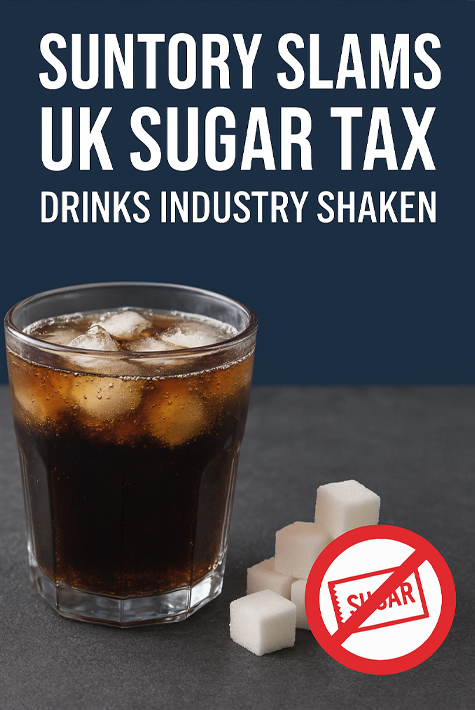Premium Biz Post – Suntory, the global beverage giant, has strongly opposed the United Kingdom’s proposed sugar tax changes. The company warns these changes could significantly affect the drinks industry. The plan aims to reduce sugar levels in beverages. Suntory argues that sudden changes could hinder innovation and disrupt established product lines.

The announcement comes amid ongoing debates on public health policy, sugar consumption, and economic impacts on beverage manufacturers. Suntory’s stance has drawn attention across the UK and global markets. It highlights tension between government health initiatives and corporate interests.
Proposed Sugar Tax Changes
The UK government recently proposed lowering the sugar threshold for taxation from 5g per 100ml to 4g per 100ml in soft drinks. Suntory warns that this reduction would impact products such as Ribena and Lucozade. These drinks currently contain sugar slightly above the new limit.
The company claims that sudden regulatory shifts could force reformulation or price increases. Consumers may feel alienated, and the market could face disruption. Critics argue that strict taxes without transition periods may damage the beverage sector’s competitiveness.
History of UK Sugar Tax
The Soft Drinks Industry Levy was introduced in 2018 to reduce sugar intake and combat obesity. It encouraged some manufacturers to reformulate products. Suntory claims further reductions could be counterproductive. Consumers value taste and consistency. Sudden changes may undermine brand loyalty.
Suntory stresses that public health goals must balance with economic sustainability. Abrupt measures may cause more harm than good, according to the company.
Read More : ”Wall Decorations from Waste Creativity that Saves the Environment”
Potential Global Impact
Analysts warn that the tax changes could affect the global beverage market. Suntory’s products are widely distributed in Europe. UK adjustments could influence similar regulations elsewhere. Smaller companies may struggle to reformulate products quickly.
Market forecasts suggest stricter sugar regulations may raise production costs. Retail prices could increase, which might reduce demand. Suntory believes that balanced policies can protect the market while promoting health.
Suntory’s Response and Strategy
Suntory has already engaged UK policymakers. The company proposes phased approaches and extended deadlines for adaptation. Executives highlight examples where gradual reformulation met health goals successfully.
The company is exploring alternatives like natural sweeteners and low-calorie options. The goal is to maintain taste, health, and profitability. Suntory emphasizes collaboration and constructive dialogue as key strategies.
Sustainability and Innovation
Suntory invests heavily in sustainability initiatives and responsible sourcing. The company aims to reduce carbon emissions, improve water management, and adopt eco-friendly packaging.
Suntory argues that combining environmental sustainability with gradual product adjustments is better than sudden taxes. This approach protects its reputation and maintains consumer trust.
Public Opinion and Industry Debate
Public opinion on sugar taxes is divided. Health advocates support stricter limits to combat obesity and diabetes. They argue taxes encourage manufacturers to reduce sugar and promote healthier choices.
Critics prefer education and voluntary reformulation. They believe these measures achieve similar results without harming the industry. Suntory’s criticism emphasizes economic and practical challenges.
Employment and Economic Considerations
Employment is a concern for Suntory. The company employs thousands in UK production facilities. Rapid reformulation could disrupt operations and require layoffs.
A phased approach can protect jobs while contributing to public health goals. Suntory highlights the importance of balancing economic stability with health initiatives.
Global Portfolio Implications
Suntory’s brands include soft drinks, juices, bottled water, and alcoholic beverages. UK policy changes may influence global product strategies. Ribena and Lucozade may need significant adjustments to meet new sugar limits.
Suntory invests in innovation to maintain taste and health benefits. Large-scale implementation requires careful planning.
Consumer Behavior
Taste, price, and brand loyalty influence purchasing decisions. Sudden policy changes could disrupt these preferences. Suntory warns of unintended consequences, such as reduced consumption of healthier drinks or increased consumption of untaxed alternatives.
Gradual adjustments, clear labeling, and public education are key strategies. They guide consumers toward healthier choices without destabilizing the market.
Lessons from International Markets
Countries like Mexico, France, and South Africa implemented sugar taxes with mixed results. Suntory studies these cases to anticipate impacts in the UK. Lessons include the importance of planning, phased implementation, and stakeholder engagement.
Suntory’s proactive stance demonstrates corporate responsibility while defending its interests.
Suntory’s opposition highlights the balance needed between public health and industry viability. The company believes abrupt changes could disrupt the market, raise costs, and limit consumer choice.
Phased implementation, collaboration, and innovation offer a sustainable path. The drinks industry, regulators, and consumers will closely monitor the outcomes. This will shape the future of beverage production and consumption in the UK and beyond.



